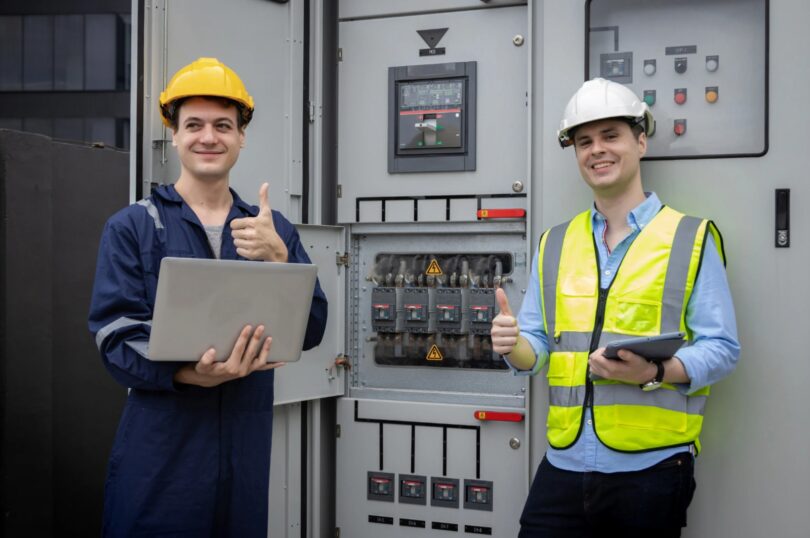Advertisements
If you’re an electrical engineer dreaming of working in the United States, you’re in the right place. The demand for skilled electrical engineers in the United States is high, with industries like technology, energy, aerospace, and telecommunications constantly looking for people with the right skills. Let’s get you to understand how you can pursue a career in electrical engineering in the USA with visa sponsorship.
Why Should You Go For an Electrical Engineering Career in the USA?
Working in the USA isn’t just about changing your scenery; it’s about growing both professionally and personally. Here’s why you might consider it:
- Diverse Opportunities: The USA offers a wide range of industries where electrical engineers are in demand, from technology and telecommunications to energy and manufacturing.
- Innovative Environment: Being at the forefront of technological advancements, the USA provides a platform to work on cutting-edge projects.
- Career Advancement: Access to numerous professional development resources and networking opportunities can propel your career forward.
Understanding Visa Sponsorship in the USA
Before we jump into the specifics, let’s clarify what visa sponsorship means. In the USA, when a company offers visa sponsorship, they’re agreeing to support your application for a work visa.
1. H-1B Visa
The H-1B visa is the most common work visa for professionals in specialized fields like electrical engineering. It allows U.S. employers to hire foreign workers in positions that require at least a bachelor’s degree in a specific field. It involves the employer filing a petition with the U.S. Citizenship and Immigration Services (USCIS) on your behalf, demonstrating that your skills are specialized and necessary for the role. This visa type is great for electrical engineers with a job offer from a U.S. company willing to sponsor their visa and also candidates who meet the specialized skill requirements for the role.
- Initial Stay: Granted for up to 3 years, extendable to 6 years.
2. O-1 Visa
The O-1 visa is designed for highly skilled professionals who have demonstrated extraordinary ability in their field through achievements, awards, or publications. This visa type is suitable for electrical engineers who have significant achievements in research, innovation, or patents and also for professionals recognized for their expertise through publications, awards, or leadership roles.
- Initial Stay: Granted for 3 years, with 1-year extensions available.
- Unlimited Renewals: As long as you continue to meet the extraordinary ability criteria.
3. TN Visa
If you are a Canadian or Mexican citizen, you can apply for a TN (Trade NAFTA) visa under the United States-Mexico-Canada Agreement (USMCA). This is because the TN visa type is for electrical engineers from Canada or Mexico who meet the educational and professional requirements.
- Initial Stay: Up to 3 years, with unlimited renewals.
4. L-1 Visa
The L-1 visa is for engineers working at multinational companies that have offices both in the U.S. and abroad. Your company must file the application for you. This visa type focuses on work experience rather than educational qualifications.
- Initial Stay: 1 year for L-1A (managers) or 3 years for L-1B (specialized knowledge employees), extendable to 7 years.
5. J-1 Visa
The J-1 visa is for engineers who want to gain training or experience through an internship, fellowship, or exchange program in the U.S. In other words, it is for those engineers seeking short-term training or research opportunities in the U.S. This visa type requires sponsorship by a designated U.S. program (not an employer).
- Limited Duration: Typically lasts 6 months to 2 years.
- Two-Year Home Residency Requirement: Some J-1 holders must return to their home country for two years before applying for another U.S. visa.
Demand for Electrical Engineers in the USA
The demand for electrical engineers in the USA is substantial. According to job listings on Indeed, there are numerous positions available for electrical engineers, some of which offer visa sponsorship. This shows that there is a healthy job market for professionals in this field.
Advertisements
Skills and Qualifications Needed
To stand out and secure a position with visa sponsorship in the USA, you’ll need a mix of technical and soft skills:
-
Technical Skills:
- Circuit design and analysis
- Power systems knowledge
- Proficiency with software like AutoCAD
- Programming skills in languages such as Python or MATLAB
-
Soft Skills:
- Problem-solving abilities
- Effective communication
- Teamwork and collaboration
Certifications That Help:
- Professional Engineer (PE) license
- Project Management Professional (PMP)
- Specialized certifications like Cisco Certified Network Associate (CCNA)
Top Job Roles for Electrical Engineers in the USA
Electrical engineers have a wide range of career opportunities in the USA, with industries like power, telecom, aerospace, and renewable energy always in need of skilled professionals. If you’re looking for a job in this field, here are some of the best roles you can explore.
Power Systems Engineer
Power systems engineers work with electricity grids, power plants, and transmission networks. Their job is to make sure electricity flows efficiently and safely to homes and businesses. They design power systems, analyze energy usage, and find ways to prevent power failures. These engineers usually work for utility companies, government agencies, and renewable energy firms. If you enjoy working with large electrical systems, this role is a great fit.
Electrical Design Engineer
Electrical design engineers create and test electrical circuits and schematics used in everything from household appliances to industrial machinery. They ensure that electrical components work safely and efficiently. This job is common in electronics companies, car manufacturers, and aerospace firms. To succeed, you need skills in circuit design, AutoCAD, and problem-solving.
Embedded Systems Engineer
Embedded systems engineers work on the software and hardware that power smart devices, medical equipment, and modern cars. They design tiny computer systems that control how devices operate. Many work for tech companies, automotive firms, and medical device manufacturers. This role requires programming skills, especially in languages like C and Python, as well as an understanding of microcontrollers.
Control Systems Engineer
Control systems engineers design automation systems that help machines and equipment function smoothly. They create technology used in robotics, manufacturing plants, and even airplanes. Their job is to make sure everything runs efficiently with minimal human intervention. These engineers often work in industrial automation, aerospace, and robotics. A strong background in programming and automation tools is important for this role.
Telecommunications Engineer
Telecommunications engineers develop and maintain systems for wireless communication, fiber optics, and satellite networks. They play a big role in advancing technologies like 5G, internet services, and space communication. They often work for telecom companies, networking firms, and government agencies. This job requires knowledge of network design, wireless technologies, and radio frequency (RF) systems.
Renewable Energy Engineer
With the push for clean energy, renewable energy engineers design and improve solar panels, wind turbines, and energy storage systems. They work on making these technologies more efficient and affordable. These engineers are employed by solar energy companies, wind farms, and environmental agencies. A passion for sustainability and a good understanding of energy systems are key to thriving in this role.
Electrical Project Engineer
Electrical project engineers manage large-scale electrical projects like power plants, buildings, and industrial installations. They handle budgeting, planning, and making sure everything meets safety standards. They often work for construction companies, engineering firms, and energy providers. Strong leadership skills and knowledge of electrical systems are essential for this role.
Semiconductor Engineer
Semiconductor engineers design and develop microchips used in computers, smartphones, and other electronic devices. They help improve processor speed and energy efficiency. These engineers work for major tech companies and electronics manufacturers. This field requires expertise in circuit design and materials science.
Aerospace Electrical Engineer
Aerospace electrical engineers develop electrical systems for airplanes, satellites, and spacecraft. They work on avionics, power distribution, and communication systems. Many work for NASA, SpaceX, Boeing, and defense contractors. This role requires knowledge of high-voltage systems, aviation standards, and circuit design.
Automotive Electrical Engineer
Automotive electrical engineers focus on vehicle electrical systems, including battery management for electric cars, infotainment systems, and safety technology. With the rise of electric and self-driving cars, this job is becoming even more important. They work for car manufacturers, electric vehicle startups, and automotive suppliers. A background in automotive circuits and battery technology is key.
Electrical Engineering Jobs with Visa Sponsorship in the USA
Job Title: Electrical Engineer – Entry Level
Hiring Company: Westinghouse Electric Co
Location: Pennsylvania, United States
Job Type: Full-time
Salary: Not specified
Job Requirements
- A Bachelor’s Degree in Electrical or Electro-mechanical Engineering is required. Westinghouse on the job experience will be considered in lieu of a bachelor’s degree if currently enrolled in a degree program.
- 0-3 years of professional experience, which can be from an internship or cooperative education program
- General knowledge of electrical distribution systems and equipment, including Low/Medium voltage switchgear, circuit breakers, motors, motor-generator sets, and motor control centers, is desired.
- Possess excellent communication, interpersonal, time management, and problem-solving skills
- Can effectively work in both a team setting and as an individual
- The ability to effectively articulate technical challenges and recommended solutions
Job Responsibilities
- The successful candidate will become part of our team responsible for the design, manufacturing, installation, troubleshooting, and project execution of electrical equipment and electrical distribution systems including legacy electro-mechanical equipment
- Preparation and review of drawings, specifications, and purchase requisitions for electrical products
- Determination of critical equipment characteristics to support nuclear equipment qualification and commercial grade dedication, including development of commercial dedication instructions
- Development of Engineered solutions to address obsolescence issues for various electrical products
- Provide engineering technical support to customers, suppliers, manufacturing, and shop operations for a variety of products
How to Apply
- Click here to begin
- Click on “Apply now”
- Create an account with Westinghouse to apply
- On the next page, fill in your details and attach the requested documents
- Submit your application and wait for feedback
Job Title: Electrical Engineer
Hiring Company: Heidelberg Materials
Location: Pennsylvania, United States
Job Type: Full-time
Salary: $84,730.00 – $112,963.33 per year
Job Requirements
- Design, develop, and maintain electrical systems and components.
- Ensure compliance with industry standards and safety regulations.
- Collaborate with cross-functional teams to optimize production processes.
- Troubleshoot and resolve electrical issues in a timely manner.
- Provide technical support and training to maintenance staff.
Job Responsibilities
- Strong knowledge of electrical systems and components.
- Proven problem-solving and analytical skills.
- Ability to work collaboratively in a team environment.
- Excellent communication and interpersonal skills.
- Proficiency in relevant software and tools.
How to Apply
- Click here to begin your application process
- Click on ‘Apply’
- Select to either ‘Autofill with Resume’, ‘Apply Manually’, or ‘Use your Last Application’
- Fill in the details on your application (depending on the option you went for)
- Review your application and then submit
- Wait for a feedback
Application Tips
When applying for positions in the USA, keep these tips in mind:
- Tailor Your Resume: Highlight experience relevant to the job description.
- Cover Letter: Clearly express your interest in relocating and any previous international experience.
- Certifications: Include any international certifications that are recognized in the USA.
- Prepare for Interviews: Be ready to discuss how you’ll adapt to a new culture and work environment.
Challenges and Considerations
Moving to the USA for work is exciting but comes with its set of challenges:
- Cultural Differences: You may find it difficult to adapt to the new social norms and workplace cultures.
- Legal Requirements: Understanding the visa process and work regulations may seem like a lot.
- Relocation Logistics: Managing the move, finding housing, and settling in. The whole idea of relocating might be exhausting for some people.
Frequently Asked Questions (FAQs)
-
What is visa sponsorship in the USA?
Visa sponsorship in the USA is when a company supports your application for a work visa, typically the H-1B visa, by filing a petition with USCIS on your behalf.
-
Do all companies in the USA offer visa sponsorship?
Not all companies provide visa sponsorship. It’s essential to research and apply to those that explicitly mention it in their job postings.
-
How long does the visa sponsorship process take in the USA?
The duration varies but can range from a few weeks to several months, depending on the visa type and processing times.
-
Are there age limits for visa sponsorship in the USA?
The USA does not typically impose age limits for work visas; qualifications and experience are the primary considerations.
-
Can my family accompany me if I get a job with visa sponsorship in the USA?
Yes, dependents can accompany you under visas like the H-4, which is linked to the H-1B visa.
-
Will the company cover relocation expenses?
Some companies offer relocation packages, but it’s not guaranteed. Discuss this during the negotiation phase.
-
What happens if I lose my job while on a sponsored visa in the USA?
Losing your job may affect your visa status. The H-1B visa, for example, allows a grace period of up to 60 days to find new employment.
-
Is it possible to switch employers on a sponsored visa in the USA?
Yes, but the new employer must file a new petition on your behalf.
Conclusion
The USA offers many opportunities for skilled electrical engineers, with industries like tech, automotive, aerospace, and renewable energy actively hiring. Finding a company that provides visa sponsorship can be challenging but it’s entirely possible with the right approach. Focus on in-demand skills, gaining relevant certifications, and apply to companies known for sponsoring international talent so you can significantly improve your chances.
The journey may take time, but if you have the determination and you put in the right strategy, you can land your dream job as an electrical engineer in the United States.
Advertisements



